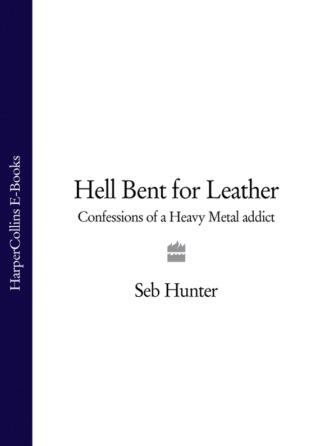
Полная версия
Hell Bent for Leather: Confessions of a Heavy Metal Addict

HELL BENT FOR LEATHER
Confessions of a Heavy Metal Addict
SEB HUNTER

COPYRIGHT
4th Estate
An imprint of HarperCollinsPublishers Ltd 1 London Bridge Street London SE1 9GF
www.harpercollins.co.uk
First published in Great Britain by Fourth Estate 2004
Copyright © Seb Hunter 2004
Seb Hunter asserts the moral right to be identified as the author of this work
A catalogue record for this book is available from the British Library
All rights reserved under International and Pan-American Copyright Conventions. By payment of the required fees, you have been granted the nonexclusive, nontransferable right to access and read the text of this e-book on-screen. No part of this text may be reproduced, transmitted, downloaded, decompiled, reverse engineered, or stored in or introduced into any information storage and retrieval system, in any form or by any means, whether electronic or mechanical, now known or hereinafter invented, without the express written permission of HarperCollins e-books.
HarperCollinsPublishers has made every reasonable effort to ensure that any picture content and written content in this ebook has been included or removed in accordance with the contractual and technological constraints in operation at the time of publication.
Source ISBN: 9780007161768
Ebook Edition © JUNE 2016 ISBN: 9780007381616
Version: 2016-07-19
PRAISE
From the reviews of Hell Bent for Leather:
‘Anyone who’s ever been too fond of music will recognise themselves in Hell Bent for Leather … Though it’s hilarious and downbeat, [Hunter] retains an honest love of the truth of rock. It’s a profound writer who can describe AC/DC and Slayer as sounding like a trolley falling down the stairs’
BILL BAILEY
‘Terrific … a thundering good read’
BRUCE DICKINSON
‘Hell Bent for Leather is a book that could do for heavy metal what Fever Pitch did for Arsenal: make the terminally unfashionable hugely commercial … this funny, honest book is both a homage to his first great love, and a deconstruction of that most maligned of pop forms. You can enjoy it without having heard a single heavy metal track. For that alone, Seb, we salute you’
Observer
‘Rock failure was very, very good for Seb Hunter … his book is a gem; a wonderfully deadpan account of his childhood obsession with heavy metal, and his subsequent attempt to make a career of it. The story is memorable not only for Hunter’s mordant self-deprecation and hilarious recitation of heavy metal trivia (how many sub-genres of glam metal can you name?), but for the unexpectedly moving conclusion’
New York Times
‘Funny and genuinely touching … he relives the developments that shook the metal world to its stack-heeled foundations’
Guardian
‘Hunter relates with easy humour and perfect pacing a tragic, glorious youth, dominated by music … he has an assured touch, good timing, genuine love and knowledge of his subject, plus just the right amount of modesty required when you’re not famous and you’ve decided to write a book about yourself anyway. Terrific!’
Time Out
‘It’s easy to laugh at metallers and Hunter’s book makes it even easier … he describes the era with affection’
Independent on Sunday
‘Irreverent, funny, candid and branching off the beaten track to include all the other things that really matter, like love, life, death, dead-end jobs, alcohol, parents, girlfriends, mates’ girlfriends, and guitars with pointy headstocks. If that rings any kind of (ahem) Hells Bell with you, then you’ll love it’
Leicester Mercury
‘Funny yet tragic … anyone who believes music changes lives will find validation here’
City Life
‘A Fever Pitch for Heavy Metal fans … Simultaneously hilarious and strangely moving … identifies the very essence of why music is important to life. Magic’
Q magazine
‘Seb Hunter’s wickedly funny biography combines the madness of Ozzy and the incisive satire of Spinal Tap with an honest and contagious passion … a delightful chronicle of the highs and lows of glorious youth’
Glasgow Herald
‘A truly brave book … an entertaining guide to heavy rituals, with diagrams explaining the need for a 12-stringed axe’
Observer Music Monthly
‘Hell Bent is more than a memoir: it’s a crash course in Metal’
Newsweek
‘Enthralling from start to finish … Hunter is never afraid to laugh at his former self and it is this factor more than any other which places Hell Bent … in the proud tradition of Giles Smith’s Lost in Music and John Aizlewood’s Love Is the Drug and makes it essential reading for any music fan, metal-obsessed or otherwise’
Liverpool Echo
‘Seb Hunter talks from a true fan’s perspective … A truly human examination of passion and music’
The List
‘Should strike a (power) chord with everyone who’s sold their soul to rock ’n’ roll … Hunter celebrates the joy of being lost in music’
Kerrang!, KKKK
‘Paints a vivid picture of the capital’s low-rent mid-80s muck ’n’ mascara scene’
Classic Rock
‘A Hornby for the Kerrang generation’
i-D magazine
‘Mixing his memories of small-town England with an encyclopedic knowledge of heavy metal, Hunter creates a book that, thanks to its combination of poignancy and hilarity, is as infectious as a well-crafted power ballad’
Publishers Weekly
‘You find yourself wanting to hug him one minute, and punch him the next’
Uncut
‘Like Nick Hornby, Hunter can’t separate pivotal points in his life from the songs he was listening to at the time. Read it and cringe – not in embarrassment, but in recognition’
Maxim
‘Brash, to the point, and earthy, this is an enjoyable disquisition on an adult-irritating strain of music that just won’t die. With advocates and chroniclers like Hunter, why should it?’
Booklist
DEDICATION
For Fa
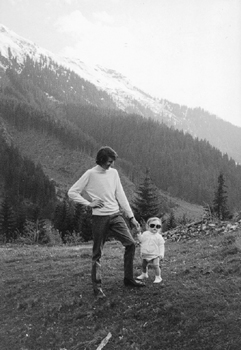
CONTENTS
Cover
Title Page
Copyright
Praise
Dedication
Prologue
Chapter One
Chapter Two
Chapter Three
Chapter Four
Chapter Five
Chapter Six
Chapter Seven
Chapter Eight
Chapter Nine
Chapter Ten
Chapter Eleven
Chapter Twelve
Chapter Thirteen
Chapter Fourteen
Chapter Fifteen
P.S. Ideas, interviews & features …
About the Author
Interview with Seb Hunter
Life at a Glance
About the Book
The Return of the Trash Can Junkies
More Music
Further Listening
Epilogue
Acknowledgements
About the Author
About the Publisher
PROLOGUE
I was in the pub with my friend Andrew and the conversation turned to ‘What specialist subject would you choose if you were to appear on Mastermind?’ He came up with the very good point that in order to proceed to the later stages of the competition, you would need a store of different specialist subjects for each new round. But as the heats progressed, the standard of fellow competitor would rise, so not only did you have to prepare – we guessed – four rounds’ worth of different specialist subjects, but you probably needed to gamble your weakest in the early rounds and save your best one ’til last. We imagined the dreadfulness of early-round elimination on some hastily cribbed topic, with our fountains of knowledge waiting primed and unused. So assuming there actually are four rounds, including the final (and yes, we’re taking huge liberties with our levels of general knowledge here), Andrew chose:
1st round: Bob Dylan
2nd round: Samuel Beckett
3rd round: Tennyson (yes, he’s a fop and a nonce)
Final: The Beatles
He really likes The Beatles.
In response I installed my beloved Beach Boys at the top of the pile and started to ponder my remaining three stages.
‘Can I have Brian Wilson as a separate round?’
‘Definitely not, or I’d have John Lennon.’
‘Oh, I see.’
It was then that a horrible truth began to dawn. It grew in my brain until I couldn’t hold it in any more. Although I am very good on The Beach Boys and, indeed, my hero Brian Wilson, there was a subject that, if I was honest with myself, I knew more about than any other. And it wasn’t big, or clever, or cool, or relevant to anything at all useful in my or anyone else’s life (unlike Brian, of course). I covered my mouth with my hand.
‘Heavy Metal,’ I said quietly.
‘What?’ Andrew appeared confused.
‘My number one isn’t The Beach Boys. It’s Heavy Metal.’
‘Really? Heavy Metal? As random as that? No focus or specification? Just the whole thing?’
‘Yes.’ My head hung in shame. ‘The whole goddamn thing.’
‘You never told me about this before.’
‘It’s kind of a secret,’ I muttered.
‘So if you got to the final of Mastermind, you’d sit there in the black chair and when asked for your chosen specialist subject, you’d calmly reply “Heavy Metal”?’
‘I’m afraid so.’
‘That’s fantastic!’
It was true. And this book is all about what I have learned, and my charmless stabs at emulation.
And hey, before you say anything – I’m not proud.
CHAPTER ONE
LET’S GET IT UP

I’m ten.
It’s 1981, a late summer evening in an underground common room at a boarding school in deepest Wiltshire. Someone is playing ‘Can-Can’ by Bad Manners on a cheap yellow record player and we’re all running around in a sweat, playing off the musical momentum, though hardly paying it much attention. And then comes my big moment, the only real eureka, blinding-light moment I’ve ever had. Some wise child peels off from the fray and clunks down AC/DC’s ‘Let’s Get it Up’, and that’s it for me. That was the light switch – the world suddenly became three-dimensional and my ears popped open.
It was so raw, so suggestive, that I had no idea how to react. This was a whole new set of rules for my body; a sudden and unexpected DNA tattoo. I stood motionless on the flagstone floor, beads of sweat hanging off my fringe, waiting for this skull-splitting rheum to end so I could calm down and return to how things had been before, but I never quite managed to get there.
‘Hey! Hey! What was that?’ I stood open-mouthed over the record player.
By the end of the week, having heard ‘Let’s Get it Up’ a further 16 times, including the B-side ‘Back in Black (live)’, all other thoughts in my head had evaporated. I taught myself how to do this, fast:

Back at home that Christmas I knew exactly what I wanted. For the last few years my parents had been feeding my thirsty Star Wars obsession, however this year I’d requested just one solitary item: a cassette by AC/DC. My mother asked me where she was supposed to purchase such a thing and I was forced to admit I had no idea. So I spent an anxious Christmas morning worrying that I’d be getting yet more Star Wars figures and not the one thing I craved so badly. But halfway through the communal giving I was handed a tape-shaped package. Slowly I peeled at the wrapping until I could clearly see a gold cover and a picture of a giant cannon, and on the back cover – oh my God – the album contained ‘Let’s Get it Up’! I felt sick and slightly dizzy and my hands had started to shake.
My mother, sensing my existential distress, plucked the plastic box away.
‘“Let’s get it up”,’ I whimpered.
My mother frowned. ‘What do you think that means?’
‘It means …’ I paused. ‘Let’s all get it sort of “up” and have fun.’
‘Well, you’re wrong, it doesn’t mean that at all, it means something entirely different.’
‘Like what?’
‘I’m not telling you. Just be careful, that’s all, don’t go around saying that sort of thing in public. And “Put the Finger on You”? What do you think that one means?’
‘It just means putting the finger on you. I don’t know.’ She doesn’t understand, I thought to myself. She just doesn’t get it!
She ran her finger through the rest of the songs, muttering under her breath, and handed it back.
‘“Let’s Get it Up” means something rude. In fact, quite a lot of these songs sound rather rude.’
You’re mad, I thought, embarrassed for her obvious misunderstanding.
As soon as the Queen’s speech was over and the family had thanked each other for their biscuits and condiments, I interrupted proceedings by loudly demanding we play my new tape.
‘Everyone will like it!’
‘But Granny …’
‘Granny will like it too!’
My father raised an eyebrow. I had up until this moment been a thoroughly charming and dutiful child, so after a moment’s consideration, the cassette player was reluctantly dragged in from the kitchen.
With my back to my extended family, I slid the new cassette into the machine and covertly inched up the volume in preparation for AC/DC’s grand opus For Those About to Rock … (We Salute You) in all its corrosive pomp. As the guitars snaked out I turned, grinning and blushing heavily, and grabbed onto the aerial to steady myself. Then the bass began to throb and I noticed some awkward shuffling on the sofa. Next came the drums – crikey they were loud! I glanced at my scary Uncle Geoff and he’d started turning purple, but still I sensed a thrill of expectancy in the room. Then came the singing – or rather some wordless yelps like a rusty iron lung – and with it a sharp, horrified wince from the entire family. It was slowly dawning on me that perhaps not everyone would love AC/DC quite as much as I’d hoped. Finally, just as the chorus came blazing through (For those about to rock! We salute you!) and I was at the very peak of excitement, my father shouted ‘Enough!’, and my mother leapt at the eject button, and I was hastily sent upstairs by Granny.
My mother and father married in 1968. My mother was an artist and a teacher, and my father ran his own property development businesses. Three years later I came along.
And then two years after that, my sister Melissa.
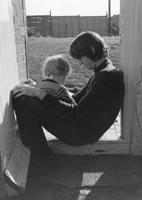
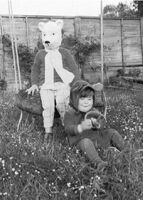
I’m Rupert the Bear, Mel’s a mouse.
For the first six years of my life we lived in an old farmhouse in the Hampshire village of Meonstoke, surrounded by farms and fields, until my father grew bored with the country and discovered a gigantic run-down Victorian house in Winchester. It looked like it would need years of work but was irresistibly cheap, so he decided to buy it. We all slept on brown corduroy cushions in the drawing room for the first few months, while the electrics were recast, water was coaxed back through the miles of disused black pipes, and the child-sized gaps in the floorboards were hastily covered with lino. This was an amazing house: it had 30 rooms, a cool vaulted cellar and a giant warren of an attic. My sister and I liked to change bedrooms whenever we felt like it because there were just so many to choose from, while my mother painted huge colourful murals on their walls for our entertainment. My father meanwhile took this sprawling house to task, attacking it with sledgehammers and drills, knocking up arches through walls in a comedy hard hat. The garden was a giant overgrown jungle in which I constructed dens out of old beehives, played laser wars with imaginary friends, smashed a football against the green garage door and goaded our cats.
At eight years old I was sent to a small boarding school miles away in the countryside near Salisbury. For the first few terms I was poleaxed by homesickness, but after a while I lightened up, and then suddenly – for the only time in my life – school became a complete delight. We wore cool navy-blue boiler suits when we went outside to play, and there was an old quarry in the vast school grounds, and hardly any girls to be scared of. I was extremely lucky to be there; my parents had had to borrow money to send me in the first place, and slowly I began to repay some of their investment. I developed a random obsession with Austria and, aged nine, began a James Bond style novel, casting myself as the heroic Austrian protagonist. I supported Austria passionately at football and in the skiing on television on Sundays, and had an Austrian flag on my bedroom wall. No-one knew what had triggered this Austrian obsession, not even me; I’d never even visited it.
During my school holidays back in Winchester I made friends with my next-door neighbour. Alexander was a spoilt only child, which meant he could get hold of almost anything. We liked playing toy soldiers, sci-fi laser war and Lego – he had so much Lego he had to keep it in buckets and giant Tupperware boxes, and his armies were so huge that wherever you walked in his house your feet would get spiked by the piles of discarded military enmeshed in the carpet. We also liked ABBA and spent many evenings dancing chaotically in Alex’s front room. We even made ABBA compilation tapes, for no better reason than Alex’s posh stereo had twin tape decks. And, for a while, that was all we knew about music.
AC/DC changed all that. First chance I got, I rushed over to Alex’s to tell him about my discovery. He went straight downstairs to request an AC/DC album from his parents, and a day later he was the proud owner of their 1979 masterpiece Highway to Hell. I was so jealous I refused to listen to it, but I couldn’t keep this up for long. As we cued-up the record for the fiftieth time, I realised that this wasn’t just a passing phase – this was the real deal, the meaning of life. There were rampant phalanxes of guitars, drumming so hefty it felt like dinosaurs were stomping round the room, and a voice so astringent it could strip paint off the walls. Alex said he was going to change his name to Alexander AC/DC and that his parents had said it was OK, and I, temporarily, believed him.
Together Alex and I learned that AC/DC had had two different singers: Bon Scott, who sang like a snake and was dead (he choked on his own sick in 1980), and his replacement Brian Johnson, who wore a flat cap and a vest and sounded like a vomiting pensioner (maybe that’s what had pissed Granny off so much). Alex and I liked Bon the best – too much Brian all in one go was distressing, and Bon sounded sexy, though we didn’t know what ‘sexy’ was exactly. We just knew Bon was cooler, and funnier, and being dead we knew he couldn’t turn around and decide to write a ballad.
Bon was great, but our favourite thing about AC/DC was their iconic lead guitarist, Angus Young. Angus was a short Australian man with straggly hair who always wore a school uniform: velvet shorts, velvet jacket, velvet cap, shirt and tie. It wasn’t the fact that he dressed like us that impressed us particularly – although we respected the gimmick – it was the sheer feral noise he made with his guitar. Every note that Angus played seemed to possess a kind of taut, evil shiver; it got us right in the diaphragm. His perpetually blazing Gibson transfixed us and we devoutly mewed every note in exhausting bouts of keep-up air guitar in Alex’s bedroom. While the rest of the DC stood rooted to the spot in their tight mucky T-shirts under their curtains of hair, Angus duck-walked his way around the stage like a depraved goblin Chuck Berry, dripping rivers of sweat behind him as he methodically, ritually disrobed. We duck-walked with our air guitars around Alex’s room, careful not to skip the needle.
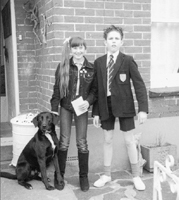
Me as Angus at my sister’s fancy-dress birthday party. L – R: dog, sister, me.
A month later, Alex’s parents took us to Le Havre for a weekend. They were both doctors and were travelling over there for a medical conference. Alex and I spent hours locked in the hotel room, squinting out over the docks, watching sea-gulls attacking cars. When we were eventually let loose in a giant department store called Les Printemps, Alex was allowed two new AC/DC albums and I was allowed one. It took us hours to choose. In the end I went for Powerage while Alex demanded Dirty Deeds Done Dirt Cheap and If You Want Blood, You Got It (I still feel estranged from both to this day). Dirty Deeds Done Dirt Cheap featured songs called ‘Big Balls’, ‘Love at First Feel’ and ‘Squealer’. It was getting harder to avoid the sexual connotations.
We were banned from listening to the tapes back at the hotel or during the journey home, which was probably a good thing anyway with all that talk of big balls. So instead we bickered over whose tape was better before we’d even heard them, and learned the track listings and the times of the songs and every detail from the covers. My tape had a picture of Angus with a crazed, electrocuted expression on his face and wires coming out of his sleeves instead of hands, which I soon discovered was exactly how he sounded inside. But Alex and and I were worried: had Angus really impaled himself upon his Gibson SG on the front of If You Want Blood, You Got It? It looked extremely convincing. How had he survived that?
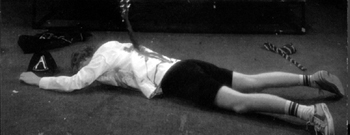
Angus – dead?
Back in Winchester, we bought up the DC back catalogue using Alex’s parents’ money and waited impatiently for their first new album since we’d discovered them. It was called Flick of the Switch and had an exciting though minimalist cover, with Angus and his guitar hanging off a giant switch. My favourite song was ‘Bedlam in Belgium’. I imagined the devastation the DC could cause in Belgium – Angus duck-walking down a blazing street that looked a bit like Le Havre, but bigger and engulfed in flames. Unfortunately for us, Flick of the Switch was their worst album to date, but we hadn’t discovered the music press yet, so it took a few years to realise.


